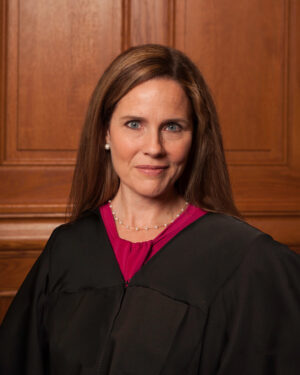
President Donald Trump will officially announce Saturday he has selected Judge Amy Coney Barrett to succeed Supreme Court Justice Ruth Bader Ginsburg, who died Sep. 18, according to people close to the process. The news reports have not been confirmed by the White House.
Just 38 days before the election, the administration will try to confirm the Barrett before November 3. President Trump met with Barrett last Monday and Tuesday and was impressed by the Notre Dame law professor. “I haven’t said it was her, but she is outstanding,” Trump told reporters at Joint Base Andrews outside Washington after CNN announced his choice. It is not known if the president has interviewed any other candidate for the Supreme Court seat.
Barrett, who is the Judge of the United States Court of Appeals for the Seventh Circuit, was a law clerk to the late conservative Justice Antonin Scalia and is known to be a conservative, pro-life Catholic. She would take the seat of the liberal icon and vocal pro-choice Justice Ginsburg, changing the balance between the liberal and conservative wings of the Supreme Court.
Barrett received national attention in 2017 during confirmation hearings for her nomination to the Seventh Circuit Court of Appeals. Senator Dianne Feinstein, D-Calif. and other members of the Senate Judiciary Committee pressed Barrett about her Catholic faith.
Senator Feinstein questioned Barrett about an article she had published arguing that Catholic judges should in some cases recuse themselves from death penalty cases due to their moral objections to capital punishment. “The dogma lives loudly within you, and that is a concern,” Senator Feinstein famously told her. Many Catholic and conservative commentators criticized the anti-Catholic bias of the comment.
The Senate approved Barrett’s nomination to the Seventh Circuit with a slim 55-43 vote.
Barrett’s demeanor during the hearings enhanced her reputation.
The news of Barrett’s nomination to the Supreme Court will be particularly significant for the pro-life movement. One of the main goals of the movement for 40 years has been supporting pro-life presidential candidates that would name pro-life judges to the Supreme Court. The hope behind this strategy is to revert the 1973 Roe vs. Wade decision that ruled abortion falls under the right to privacy and is protected by the 14th Amendment to the Constitution. A majority of pro-life judges on the Supreme Court could make reverting Roe vs. Wade possible.
Barrett’s confirmation process will further polarize the charged 2020 electoral campaign. Republicans and Democrats hope that the confirmation process will mobilize their respective bases for the coming election. Both conservative and liberal interest groups have already prepared multi-million dollar campaigns to influence the Senate confirmation and its impact in the coming election.
